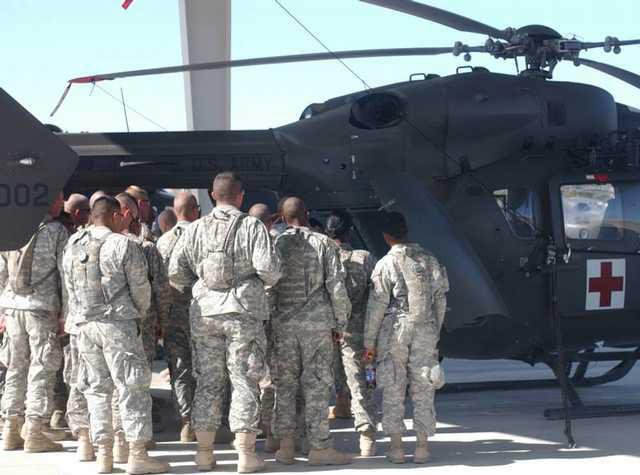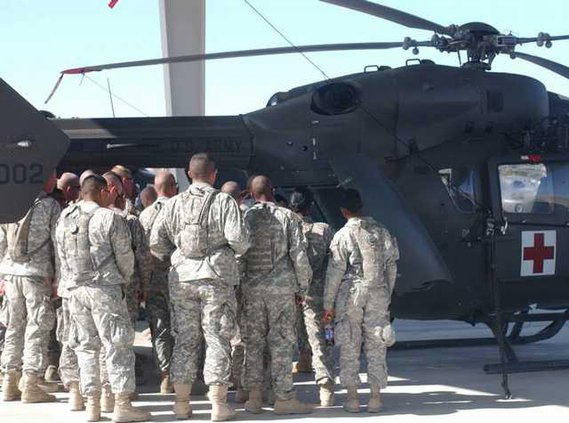FORT IRWIN, Calif. — “Every soldier is essentially an ambassador,” Sgt. 1st Class James Kile, a National Training Center instructor with 21 years as an Army medic, told a roomful of medics in training.
“By and large, we have been all over (Iraq). You’re not making first impressions; you’re making lasting impressions.”
Fort Stewart’s 1st Brigade, including its 3rd Brigade Support Battalion’s medical company, Charlie Company, is currently training at NTC here. The 1st Brigade will deploy to Iraq for the Army’s advise and assist mission in the next several months.
“You’re going to be in that area for some time,” Kile told trainees. “You’re going to get to know these people.”
The NTC instructor also told soldier students that should they give physicals to any detainees that are brought in, they should be mindful if a detainee “opens up” to offer valuable information.
“Sometimes they start talking when you show them a little compassion,” he said.
Kile told his medics their job is not to interrogate detainees. However, if they’re given information, they should record it and “send it along.”
Charlie Company’s medical personnel are trained to save lives and provide preventative care for soldiers. Charlie Company will also provide medical care to Iraqis while in Iraq.
“We are what their medical care is, for the most part,” said 2nd Lt. Kristen Kelleher of Charlie Company. “We’ll see more Iraqis than Americans at times.”
Kelleher said Charlie Company includes medics, two physician’s assistants, a dentist, one dental technician and two laboratory technicians. The company will be receiving a doctor and a surgeon in the near future, she said.
In addition, Charlie Company’s responsibilities include testing water quality to prevent contamination when out in the field, testing insects to prevent potential spread of disease, food service inspection, hearing conservation, maintaining a pharmacy and offering mental health services.
The medical personnel, as well as the rest of brigade’s soldiers, are learning how to interact with people of different cultures while at NTC. And, medics are being trained how to treat wounded soldiers should insurgents attack.
The scenarios are made as realistic as possible so medics can perform live-saving procedures and make split-second decisions under extreme duress.
“You, as the medic, are making the decisions on the ground,” Kile told his soldier students. “The medics who gather the most information (when assessing a patient) make the best decisions.”
Kile urged the medics to ask questions now because mistakes made in the field can have dire consequences.
“In theater, your patients don’t reset themselves,” he said, referring to the mannequins used to simulate patients.
Kile has recruited amputees to role play during NTC training, when soldiers head to the center’s mock cities to experience urban warfare. The instructor has special-effects technicians create realistic looking wounds on the actors.
During the classroom training, Kile also went through various procedures used in the field, such as applying tourniquets and documenting symptoms of head trauma. He advised medics not to overlook the fundamentals of patient assessment, such as taking a pulse or keeping a soldier warm so they do not suffer hypothermia – even in 120 degree heat. A person who has lost a lot of blood can experience a dangerous drop in body temperature, the instructor reminded trainees.
He also urged medics to document patient cases accurately and thoroughly. This is to ensure that when a soldier is brought to the next level of care, such as a field hospital or has to be medically evacuated to a military hospital, those records will serve the patient well.
Kile also reminded his medics that a soldier’s medical records will follow him or her throughout their lives should they be considered disabled and need life-long care.
Staff writer Denise Etheridge is embedded with the 1st Brigade at NTC this week.
“By and large, we have been all over (Iraq). You’re not making first impressions; you’re making lasting impressions.”
Fort Stewart’s 1st Brigade, including its 3rd Brigade Support Battalion’s medical company, Charlie Company, is currently training at NTC here. The 1st Brigade will deploy to Iraq for the Army’s advise and assist mission in the next several months.
“You’re going to be in that area for some time,” Kile told trainees. “You’re going to get to know these people.”
The NTC instructor also told soldier students that should they give physicals to any detainees that are brought in, they should be mindful if a detainee “opens up” to offer valuable information.
“Sometimes they start talking when you show them a little compassion,” he said.
Kile told his medics their job is not to interrogate detainees. However, if they’re given information, they should record it and “send it along.”
Charlie Company’s medical personnel are trained to save lives and provide preventative care for soldiers. Charlie Company will also provide medical care to Iraqis while in Iraq.
“We are what their medical care is, for the most part,” said 2nd Lt. Kristen Kelleher of Charlie Company. “We’ll see more Iraqis than Americans at times.”
Kelleher said Charlie Company includes medics, two physician’s assistants, a dentist, one dental technician and two laboratory technicians. The company will be receiving a doctor and a surgeon in the near future, she said.
In addition, Charlie Company’s responsibilities include testing water quality to prevent contamination when out in the field, testing insects to prevent potential spread of disease, food service inspection, hearing conservation, maintaining a pharmacy and offering mental health services.
The medical personnel, as well as the rest of brigade’s soldiers, are learning how to interact with people of different cultures while at NTC. And, medics are being trained how to treat wounded soldiers should insurgents attack.
The scenarios are made as realistic as possible so medics can perform live-saving procedures and make split-second decisions under extreme duress.
“You, as the medic, are making the decisions on the ground,” Kile told his soldier students. “The medics who gather the most information (when assessing a patient) make the best decisions.”
Kile urged the medics to ask questions now because mistakes made in the field can have dire consequences.
“In theater, your patients don’t reset themselves,” he said, referring to the mannequins used to simulate patients.
Kile has recruited amputees to role play during NTC training, when soldiers head to the center’s mock cities to experience urban warfare. The instructor has special-effects technicians create realistic looking wounds on the actors.
During the classroom training, Kile also went through various procedures used in the field, such as applying tourniquets and documenting symptoms of head trauma. He advised medics not to overlook the fundamentals of patient assessment, such as taking a pulse or keeping a soldier warm so they do not suffer hypothermia – even in 120 degree heat. A person who has lost a lot of blood can experience a dangerous drop in body temperature, the instructor reminded trainees.
He also urged medics to document patient cases accurately and thoroughly. This is to ensure that when a soldier is brought to the next level of care, such as a field hospital or has to be medically evacuated to a military hospital, those records will serve the patient well.
Kile also reminded his medics that a soldier’s medical records will follow him or her throughout their lives should they be considered disabled and need life-long care.
Staff writer Denise Etheridge is embedded with the 1st Brigade at NTC this week.

